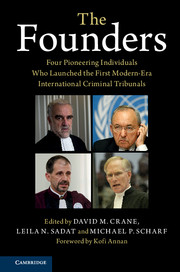 The Founders
The Founders 7 - Extraordinary Chambers in the Courts of Cambodia
from PART II - THE FOUNDERS
Published online by Cambridge University Press: 23 March 2018
Summary
When, in the fall of 2005, I saw the email in my work inbox, the name didn't ring a bell – but the address, @un.org, was very familiar. After all by then I had, over the preceding nine years, been a legal officer with the Office of the Prosecutor of the International Criminal Tribunal for Rwanda (ICTR), the Mitrovica regional legal advisor for the United Nations Mission in Kosovo, and a prosecutor at the Serious Crimes Unit of the United Nations Mission in East Timor. Even my last international assignment, as a senior trial attorney with the Office of the Prosecutor for the Special Court for Sierra Leone (SCSL) was with an institution that had all the trappings of a UN body.
Despite all that, I was not expecting any contact from the UN, given that I had not applied for any position in the almost two years that I had been back in my job as a counsel with the War Crimes Unit of the Department of Justice Canada in Ottawa. Therefore, I was floored when upon opening the attached letter, I learned that I had been shortlisted for the post of international co-prosecutor with the Extraordinary Chambers in the Courts of Cambodia (ECCC). I still remember that the letter was “on behalf of the Secretary-General of the United Nations” and was signed by the then legal advisor to the UN, Nicolas Michel. That was pretty heady correspondence for a guy whose last assignment had been at P5 level. I called my wife and read her the letter over the phone. I then brought a copy to my boss, who was also suitably impressed although, after my various leaves of absence, not exactly thrilled. I assured him that I had no clue how I had ended up on the short list, but he seemed dubious.
The mystery of my selection would later be cleared up. Months before the email, I had seen a web post from an NGO, whose name I forgot, inviting candidates interested in what was then a very theoretical court, to send in their CVs in order to be included into a database.
- Type
- Chapter
- Information
- The FoundersFour Pioneering Individuals Who Launched the First Modern-Era International Criminal Tribunals, pp. 126 - 144Publisher: Cambridge University PressPrint publication year: 2018


